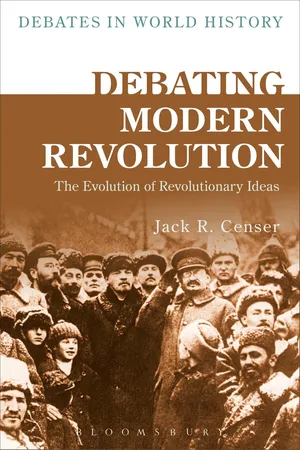
- 240 pages
- English
- PDF
- Available on iOS & Android
About This Book
Revolution is an idea that has been one of the most important drivers of human activity since its emergence in its modern form in the 18th century. From the American and French revolutionaries who upset a monarchical order that had dominated for over a millennium up to the Arab Spring, this notion continues but has also developed its meanings. Equated with democracy and legal equality at first and surprisingly redefined into its modern meaning, revolution has become a means to create nations, change the social order, and throw out colonial occupiers, and has been labelled as both conservative and reactionary. In this concise introduction to the topic, Jack R. Censer charts the development of these competing ideas and definitions in four chronological sections. Each section includes a debate from protagonists who represent various forms of revolution and counterrevolution, allowing students a firmer grasp on the particular ideas and individuals of each era. This book offers a new approach to the topic of revolution for all students of world history.
Frequently asked questions
Information

Table of contents
- Cover
- Contents
- Illustrations
- Acknowledgments
- Introduction
- 1 The Emergence of Modern Theories of “Rights” and the First Modern Revolution
- 2 Latin America and Europe and the New National and Economic Meanings of Revolution, 1800–1871
- 3 Communism and the Modern Social Meaning of Revolutions Led by Centralized Parties, 1880–1949
- 4 The Global World of Revolution: Colonialism, Decolonization, and Anti-Western Views
- Conclusion: Further Reflections
- Notes
- Index